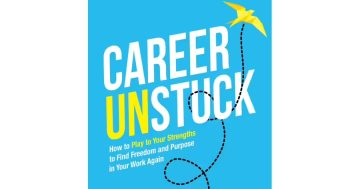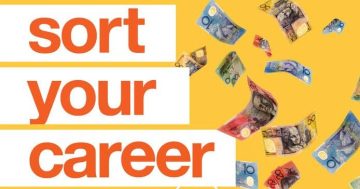
It has been predicted that the average half-life of current skills may be just five years. Photo: Movemeon.
Michelle Gibbings says the advent of artificial intelligence is going to turn many traditional careers upside down. She suggests ways you can keep ahead of the inevitable disruptions to come.
Careers have twists and turns, ups and downs, and many unexpected chances and challenges.
If someone had asked me to map out my career when I was in my early 20s, I would never have envisaged it unfolding as it has: multiple roles, and different companies, geographies and professions.
In their book The 100-Year Life, Professors Lynda Gratton and Andrew Scott, from the London Business School, advocate for pursuing a multi-career pathway.
This makes sense when you look into the not-too-distant future and see how the world of work is continuing to change, with roles coming and going and new professions emerging.
There’s little doubt that AI will transform your job, profession, industry and organisation. How fast that transformation will be is a matter of speculation. It has been predicted in an article in the Harvard Business Review that the average half-life of skills is less than five years, and in some tech fields, it’s as low as two and a half years.
If you’ve never considered it, you may soon realise it’s time to consider a career leap. Career leaps come in many forms. You can leap across functional roles, occupations, industries, levels and geographic zones, or a combination of all of these.
Career leaps take planning, dedication and determination. A crucial first step is evaluating what type of career leap suits you.
In my work with clients, I’ve found that identifying your career leap is best done in the context of your whole life.
Your personal and professional lives are intertwined — decisions in one sphere impact the other.
People have different aspirations and inspirations that drive their careers. For some, it may be a job that pays the bills. In comparison, others may see work as central to their identity and seek a fulfilling, challenging job that contributes to society.
Similarly, individual circumstances will influence career choices.
Get specific about the type of environment you want to work in, the minimum salary you need to maintain or expand your lifestyle, alignment with your purpose, the flexibility required and whether you are willing to relocate.
Often, we view a new career with rose-tinted glasses, only to find out later that the reality of the job is quite different and the shift is more complicated than expected.
For example, a 2021 report from consulting firm DDI found that 47 per cent of executive appointments made from outside the organisation failed.
Do your homework and research what the market is like.
Is it growing or contracting? Where are the pitfalls and opportunities? Will you be able to earn enough money? Are there barriers to entry and educational requirements?
Seek out connections and find people who work in the field to test the viability and sustainability of your potential career leap, discovering what it’s like to work there and what it takes to be successful.
Uncover the positives and negatives and what they wish they had known before starting this career path.
Following the flow and doing what everyone else does can be easier. In contrast, pursuing your purpose and aspirations can come with a ”risk” tag attached. To forge your path, you want to get comfortable with ambiguity, be ready to make tough choices and back yourself.
Examine the risks associated with your proposed career leap in these four dimensions:
- Financial: You may earn less during the transition to your new career, or if the decision doesn’t work out, there may be a period where you are not making an income or earning enough to cover your expenses. On the other hand, the career shift may elevate your current or future earning capacity.
- Health: A career change can be stressful for you and those around you, and it becomes worse if the leap isn’t going well. Consider the impacts on your mental health and wellbeing and your readiness to navigate the ups and downs of a career change.
- Relationships: If your leap isn’t supported by the significant other in your life, deciding to make a career change can strain your relationship. Similarly, staying in a job you hate isn’t good for your relationship.
- Reputation: You can suffer reputational damage if your leap isn’t managed well, while it can be a career accelerator when you land that plum role.
The more you are willing to take a risk and have a go, the more likely you will find a rewarding career. Remember, people around you may question your choice and challenge your thinking. Don’t let their fears and expectations throw you off course.
In deciding on your career leap, consider whether there are time imperatives. You may have no timeframe or a set timeframe in which you need to move careers. Once you’ve specified your timeframe, you want to examine the effort required to land your leap. You may need to learn new skills, build new networks and reposition yourself in the market.
A career leap high in effort doesn’t mean it isn’t worth pursuing. It’s about being realistic so there’s a match between your required timeframe and the effort involved.
If you must land a new job quickly to afford the rent or keep paying the mortgage, and your desired destination will take a long time to get there, it may not be a wise move (yet).
Life is a series of choices; often, doing one thing requires you to give up something else.
For example, you may be willing to accept less money initially because the role is a great learning opportunity and provides the stepping stone for your next big career leap. Know what matters to you so you can know what you are willing to trade.
While assessing whether a career leap is right for you, discard others’ expectations. Expectations drive us to hold a fixed view of the job we ”should” do and the career we ”should” have.
However, doing something just because you ”should” isn’t likely to satisfy you. You are far more likely to succeed when you focus on what you ”could” do.
As the poet Robert Frost wrote: “Two roads diverged in a wood, and I took the one less travelled by, and that has made all the difference.”
*Michelle Gibbings is a Melbourne-based change leadership and career expert and founder of Change Meridian. She works with global leaders and teams to help them get fit for the future of work. She can be contacted at [email protected]. This article first appeared at https://www.changemeridian.com.au/latest-news/.











